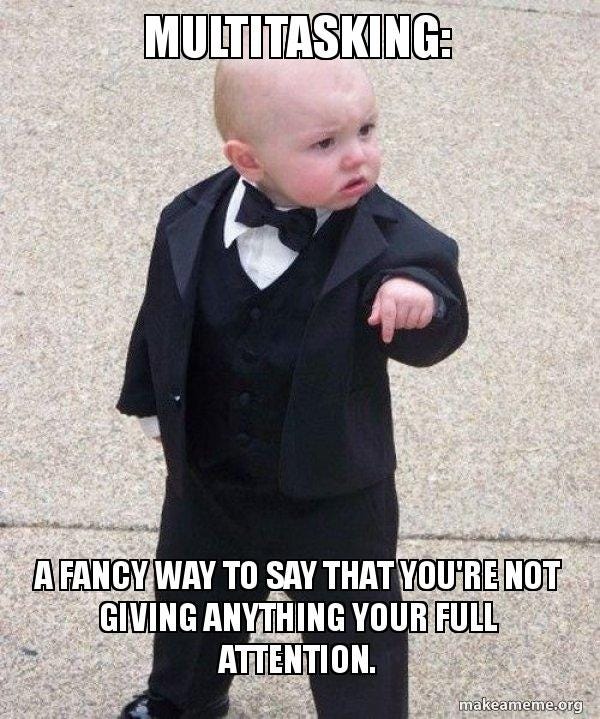The Illusion of Multitasking: A Deep Dive into Focus and Productivity
Written on
Understanding the Myth of Multitasking
The concept of multitasking is often romanticized, yet science reveals that our brains are not equipped to manage two tasks simultaneously.

My journey into the reality of multitasking began with a professional crisis that made me realize it’s largely a myth. While working from home, I was responsible for conducting interviews via Microsoft Teams. At the same time, my children—one in Kindergarten and another in 2nd Grade—were seeking my help with their schoolwork.
As I struggled to balance these competing demands, my youngest repeatedly knocked on the door, asking for assistance in finding his teacher's page. Unfortunately, my focus was divided; I was engrossed in an interview with two other panelists. The challenge of concentrating on the candidate while my son needed my help was overwhelming.
During the interview, I briefly went off-camera, violating my employer’s policy, to assist my kindergartener with his task while attempting to listen to the candidate. However, my attention was split; I missed key points from the interview and neglected to take necessary notes.
Feeling inadequate, I promised my son I would return after finishing the interview. As I returned to my workspace, my 2nd grader also required assistance with a math problem. Again, I could not provide the help he needed, and I felt frustrated as I reassured him I would be back.
The Realities of Multitasking
It became clear to me that multitasking is often an unrealistic expectation. The notion that one can excel at several tasks at once is misleading. Yes, I can perform multiple tasks, but at what cost?
After completing the interview, I watched my children enjoy their lunch break, but I was overwhelmed with emotion. I found myself crying—not just from that single instance but from a persistent sense of inadequacy. This incident highlighted my struggle with maternal guilt, as I felt I was failing both my children and my employer.
When I reflected on the day, I realized I had failed to help my kindergartener find his page, assist my 2nd grader with math, and fully engage in the interview. My attempts to juggle the roles of mother, hiring manager, and virtual teacher were futile.
The Illusion of Efficiency
Research supports the idea that multitasking is a fallacy; the brain cannot effectively process multiple streams of information at once. Studies indicate that interruptions can extend task completion time by 50% and lead to a significant increase in errors (John Medina).
Ultimately, I learned that prioritizing tasks leads to higher quality results compared to the mediocre output produced by attempting to do everything at once.
“Productivity is not an accident. It is always the result of a commitment to excellence, intelligent planning, and focused effort.” — Paul J. Meyer.
For more insights, consider joining my email list as we build a supportive community together.
Chapter 2: Exploring Practical Strategies for Focus
In this video, "The Myth of Multitasking Test (2014 Version - See Description for newest video!)", the discussion focuses on the common misconceptions surrounding multitasking and its impacts on productivity.
The video "Try the Myth of Multitasking Exercise! | Updated Version of Multitask Test" encourages viewers to engage in exercises that reveal the inefficiencies of multitasking.